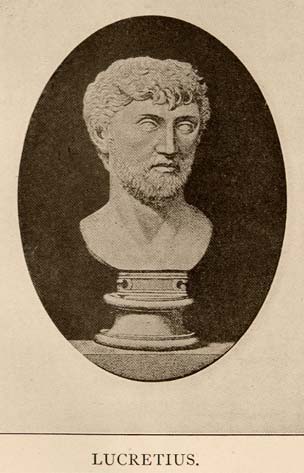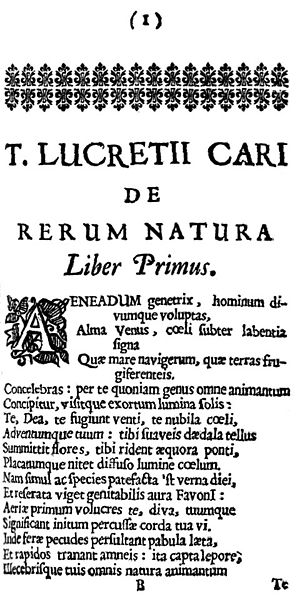<Back to Index>
- Poet and Philosopher Titus Lucretius Carus, 99 B.C.
PAGE SPONSOR


Titus Lucretius Carus (ca. 99 BCE – ca. 55 BCE) was a Roman poet and philosopher. His only known work is an epic philosophical poem laying out the beliefs of Epicureanism, De rerum natura, translated into English as On the Nature of Things or "On the Nature of the Universe".
Virtually no details have come down concerning the life of Lucretius; though Jerome tells
how he was driven mad by a love potion and wrote his poetry in between
fits of insanity, eventually committing suicide in middle age, modern scholarship suggests this account was likely an invention. The De rerum natura was a considerable influence on the Augustan poets, particularly Virgil (in his Aeneid and Georgics, and to a lesser extent in his Eclogues) and Horace. It virtually disappeared during the Middle Ages, but was rediscovered in Florence in 1417, by Poggio Bracciolini, and played an important role both in the development of atomism (Lucretius was an important influence on Pierre Gassendi), and in the efforts of various figures of the Enlightenment era to construct a new Christian humanism.
Very little is known about Lucretius's life; the only certain fact is that he was either a friend or a client of Gaius Memmius, to whom he dedicated De Rerum Natura.
Another piece of information is found in a letter Cicero wrote to his brother Quintus in February 54 BCE. Cicero writes: "The poems of Lucretius are as you write: they exhibit many flashes of genius, and yet show great mastership." Apparently, by February 54 BCE both Cicero and his brother had read De Rerum Natura. However, internal evidence from the poem (such as various repetitions, and the sudden end in Book 6 in the middle of the description of the plague at Athens) suggests that it was published without a final revision, possibly due to its author's death. If this is true, Lucretius must have been dead by February 54 BCE.
Virgil writes in the second book of his Georgics, clearly referencing Lucretius, "Happy is he who has discovered the causes of things and has cast beneath his feet [subiecit pedibus; cf. Lucretius 1.78, religio pedibus subiecta, "religion lies cast beneath our feet"] all fears, unavoidable fate, and the din of the devouring Underworld."
A brief biographical notice is found in Aelius Donatus's Life of Virgil, which seems to be derived from an earlier work by Suetonius. The statement runs as follows: "The first years of his life Virgil spent in Cremona, right until the assumption of his toga virilis, which he accepted on his 17th birthday, when the same two men held the consulate, as when he was born, and it so happened that on the very same day Lucretius the poet passed away." The information in this testimony is internally inconsistent. Virgil was born in 70 BCE, and his 17th birthday therefore took place in 53 BCE. However, the two consuls of 70 BCE, Pompey and Crassus, stood together as consuls again in 55, not 53.
A yet more brief notice is found in the Chronicon of Donatus's pupil, Jerome. Writing 4 centuries after Lucretius's death, he enters under the 171st Olympiad, the following line: "Titus Lucretius the poet is born. Later he was driven mad by a love potion, and when, during the intervals of his insanity, he had written a number of books, which were later emended by Cicero, he killed himself by his own hand in the 44th year of his life." The claim that he was driven mad by a love potion, although defended by some, is often dismissed as the result of historical confusion, or anti - Epicurean slander. Similarly, the statement that Cicero emended (Latin: emendavit) the work prior to publication is doubtful. The exact date of his birth varies by manuscript; in most it is tallied under 94 BCE, but in others under 93 or 96.
It's
impossible to know the credibility of the accounts of Donatus and
Jerome, since they wrote long after the poet's death, the latter author
belonged to a theological tradition explicitly hostile to Epicureanism, and
the sources of their off - hand comments are unknown. However, if 55 BCE
is Lucretius's most likely year of death, and if Jerome is accurate
about Lucretius's age (43) when he died, it can then be concluded he was
born in 99 or 98 BCE. These are a lot of ifs, and it may be wisest to simply say that Lucretius was born in the 90s BCE and died in the 50s BCE. This ties in well with the poem's many allusions to the tumultuous state of political affairs in Rome and its civil strife.
According to Lucretius's frequent statements in his poem, the main purpose of the work was to free Gaius Memmius's mind of the supernatural and the fear of death. He attempts this by expounding the philosophical system of Epicurus, whom Lucretius glorifies as the hero of his epic poem.
Lucretius identifies the supernatural with the notion that the gods / supernatural powers created our world or interfere with its operations in any way. He argues against fear of such gods by demonstrating through observations and argument that the operations of the world can be accounted for in terms of natural phenomena — the regular but purposeless motions and interactions of tiny atoms in empty space.
He argues against the fear of death by stating that death is the dissipation of a being's material mind. Lucretius uses the analogy of a vessel, stating that the physical body is the vessel that holds both the mind (mens) and spirit (anima) of a human being. Neither the mind nor spirit can survive independent of the body. Thus Lucretius states that once the vessel (the body) shatters (dies) its contents (mind and spirit) can no longer exist. So, as a simple ceasing - to - be, death can be neither good nor bad for this being. Being completely devoid of sensation and thought, a dead person cannot miss being alive. According to Lucretius, fear of death is a projection of terrors experienced in life, of pain that only a living (intact) mind can feel. Lucretius also puts forward the 'symmetry argument' against the fear of death. In it, he says that people who fear the prospect of eternal non - existence after death should think back to the eternity of non - existence before their birth, which they probably do not fear.
The
structure of the poem over the six books falls into two main parts. The
first three books provide a fundamental account of being and
nothingness, matter and space, the atoms and their movement, the
infinity of the universe both as regards time and space, the regularity
of reproduction (no prodigies, everything in its proper habitat), the
nature of mind (animus, directing thought) and spirit (anima,
sentience) as material bodily entities, and their mortality, since,
according to Lucretius, they and their functions (consciousness, pain)
end with the bodies that contain them and with which they are
interwoven. The last three books give an atomic and materialist
explanation of phenomena preoccupying human reflection, such as vision
and the senses, sex and reproduction, natural forces and agriculture, the heavens, and disease.
His poem De Rerum Natura (usually translated as "On the Nature of Things" or "On the Nature of the Universe") transmits the ideas of Epicurean physics, which includes Atomism, and psychology. Lucretius was one of the first Epicureans to write in Latin.
Lucretius
compares his work in this poem to that of a doctor healing a child:
just as the doctor may put honey on the rim of a cup containing bitter wormwood (most likely Absinth Wormwood)
believed to have healing properties, the patient is "tricked" into
accepting something beneficial but difficult to swallow, "but not
deceived" by the doctor (Book IV lines 12 - 19). The meaning of this
refrain found throughout the poem is debatable.
Cornelius Nepos, in his Life Of Atticus, mentions Lucretius as one of the greatest poets of his times.
Ovid, in his Amores, writes: Carmina sublimis tunc sunt peritura Lucreti / exitio terras cum dabit una dies (which means the verses of the sublime Lucretius will perish only when a day will bring the end of the world).
Vitruvius (in the De Architectura), Quintilian (in his Institutiones Oratoriae) and Statius (in the Silvae) also show great admiration for the De Rerum Natura.
Michel de Montaigne, in one of his Essays, On Books, lists Lucretius along with Virgil, Horace, and Catullus as his four top poets.
Antoine de Saint - Exupery, notes Lucretius in "Southern Mail / Night Flight" on page 20.
Lucretius has also had a marked influence upon modern philosophy, as perhaps the most complete expositor of Epicurean thought. His influence is especially notable in Spanish - American philosopher George Santayana, who praised Lucretius (along with Dante and Goethe) in his book 'Three Philosophical Poets.'